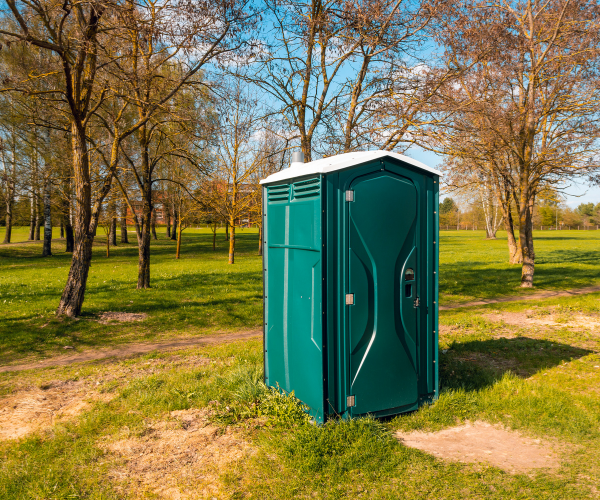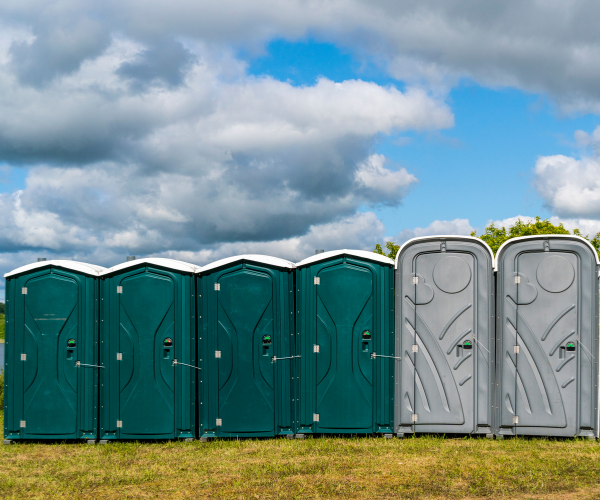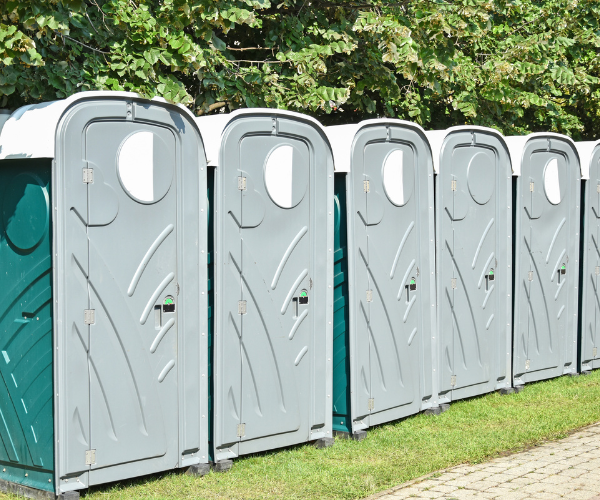Portable toilets offer several eco-friendly advantages that contribute to reducing environmental impact. First, portable toilets significantly conserve water. Traditional flush toilets can use up to 7 gallons of water per flush, while portable toilets use only about 2 ounces per flush. This massive reduction in water use is crucial for areas prone to drought or lacking in clean water resources.Additionally, portable toilets help to minimize pollution. The design prevents waste from being dispersed into the surrounding environment, thereby protecting local ecosystems and groundwater from contamination. This is particularly beneficial in sensitive natural areas, construction sites, and events where traditional plumbing systems are not feasible.Modern portable toilets are often built with sustainable materials such as recycled plastics, enhancing their environmental credentials. They are also more energy efficient, utilizing less electricity or even solar power to operate lights, ventilation systems, and handwashing stations. This energy efficiency reduces the carbon footprint associated with their use.Furthermore, the waste collected from portable toilets can be repurposed. Companies use specialized treatment facilities to treat and convert waste into biogas and fertilizers rather than disposing it in landfills. This process not only helps in producing clean energy but also enriches the soil, closing the loop on waste management.Choosing portable toilets also supports organized waste management practices which promote responsible sanitation. This minimizes illegal dumping or improper disposal, safeguarding urban areas and natural settings alike. Through informed logistics and proactive planning, companies can optimize their deployment and retrieval processes to further lessen environmental disruption.In summary, portable toilets offer a practical and eco-conscious solution for sanitation needs, demonstrating responsible resource usage, waste management, and environmental conservation.

Portable Toilet Rentals in Fletcher, South Carolina
Call today for a free quote (864) 477-7907
Portable Toilet
Fast, Easy, & 100% Free To Get Started
Over 20 Years Of Experience
For over 20 years, we have proudly delivered quality portable toilet solutions to the Fletcher community. Our established history and deep local connections guarantee reliable service with a steadfast commitment to excellence.
Commitment to Quality
Our company commits to delivering exceptional quality in every Portable Toilet. Upholding rigorous standards, we ensure clients receive the most reliable and sanitary units tailored to their specific needs.
Prompt and Reliable Delivery
Enjoy fast and reliable delivery through our portable toilet services. We respond promptly to meet tight deadlines, ensuring your event or project in South Carolina is equipped with top-notch facilities.
Reliable Portable Toilet Solutions in Fletcher
Call for a Free Quote Today
(864) 477-7907
Located in Fletcher, South Carolina, our portable toilet company is your top choice for dependable and professional service. We pride ourselves on being locally owned and prominently serving our community with reliable solutions. Whether you're planning a construction project, hosting a wedding, organizing a festival, or throwing a party, we have the cleanest, most reliable portable toilets to meet your needs. Our clients in Fletcher and the surrounding areas trust us for prompt delivery and high-quality sanitation solutions. With a steadfast commitment to customer satisfaction, we ensure all units are thoroughly cleaned and well-maintained for your event. Our dedication to excellence makes us the preferred choice for any occasion requiring on-site restroom facilities. Experience hassle-free service by choosing our portable toilets for your next event.


Our standard porta john rental units are durable and reliable for any commercial build site, housing development, public works project, or remodel job.Features include dome lighting, grated floors, and an “In-Use” locking mechanism for privacy and comfort. Regularly maintained, inspected, and cleaned by FusionSite at your location.

Developed as an alternative to full ADA-compliant restrooms, the Liberty is a spacious, wheelchair-accessible unit that can also be promoted as a family-sized restroom. Includes a patented flat-floor system for easy wheelchair access and maneuverability.Handrails, paper holder, and rotary latch are designed for simple, intuitive end-user operation.

Portable hand washing stations are essential for keeping your work site sanitary and clean. Features hands-free foot pumps, liquid soap, and paper towels.Perfect for job sites without water hookups, these units can handle hundreds of washes between services.
We Proudly Serve
Standard Portable Toilets
LittleJohn Toilets offers top-notch Standard Portable Toilets for South Carolina events and projects.
High Rise Portable Toilets
High Rise Portable Toilets provide Fletcher with secure sanitation solutions for elevated sites.
Restroom Trailers
LittleJohn Toilets' Restroom Trailers enhance Fletcher events with luxurious portable facilities.
Roll off Dumpsters
For clean, efficient waste management, opt for our Roll off Dumpsters at LittleJohn Toilets in Fletcher.
Septic Tank Cleaning
LittleJohn Toilets offers comprehensive Septic Tank Cleaning services across South Carolina.
Grease Trap Cleaning
In Fletcher, South Carolina, trust LittleJohn Toilets for reliable Grease Trap Cleaning services.
Fencing & Barricades
LittleJohn Toilets' Fencing & Barricades service in South Carolina ensures safety and organization.
Residential Storage
Secure your belongings with LittleJohn Toilets' Residential Storage Solutions in Fletcher.
Fletcher Portable Toilet and More
Getting a quote and scheduling delivery for a portable toilet has never been more convenient. Our user-friendly online forms make requesting a quote as easy as clicking a button, ensuring you receive the information you need quickly. Once you submit your first and last name, phone number, and email, expect a speedy response from our dedicated team ready to assist you in selecting the right portable toilet for your needs.We offer streamlined services designed for your convenience, whether you're planning a large event, managing a construction site, or simply need temporary restrooms for any occasion. Our delivery services are tailored to meet tight schedules and ensure prompt arrival on-site, so you can focus on executing a successful event or project. You will appreciate the seamless process of securing high-quality portable toilets that meet your specific requirements.Our commitment to offering reliable, clean, and well-maintained portable toilets makes it easy for you to provide hygienic facilities to your guests or workers. With our straightforward booking system and attentive customer service, getting a quote and delivery has never been more straightforward.

Fletcher, nestled amidst beautiful landscapes, hosts a vibrant array of community events, with the annual Fletcher Firefly Festival being a local favorite. As you plan your outdoor gatherings, the need for reliable and pristine portable toilets becomes essential. Our services are designed to blend effortlessly with Fletcher’s unique characteristics, enhancing the overall experience for your guests. Enjoy top-tier sanitation facilities that preserve the charm and cleanliness of renowned venues, like Fletcher Community Park. With our portable toilets, exploring the great outdoors is always a pleasure. Whether it's a festival or an intimate wedding, our solutions improve the experience by offering hygienic amenities that impress all attendees. Our units are strategically placed to ensure maximum accessibility and privacy. Choose our services to enjoy the best of both worlds—Fletcher’s hospitable community events alongside exceptional restroom facilities. Provide guests with the comfort they deserve and ensure event success by opting for our trusted portable toilet rentals.
Why is our company the best choice in Fletcher? Rooted deeply in Fletcher, we intimately understand the community's unique needs and consistently deliver exceptional customer satisfaction. Our broad expertise and diverse range of portable toilet options distinguish us, enhancing any event with top-tier sanitation solutions.Our dedication to providing clean and reliable portable toilets, coupled with proactive customer service, builds the core of our stellar reputation. Whether at a large public festival or a cozy family gathering, you'll discover the ideal portable toilet solution with us in Fletcher. Enjoy the simplicity and trustworthiness of collaborating with our experienced professionals for all your event or project requirements.
Our company specializes in offering prompt and dependable portable toilet services, vital for a seamless event or construction project experience. The moment you reach out, our team springs into action with a rapid response, meticulously working to meet your needs with distinction.Armed with the right tools and expertise, our delivery team ensures swift service, positioning our portable toilets precisely when required. You will value our dedication to punctual delivery and steady service, establishing us as the preferred provider for effective sanitation solutions.
Discover Fletcher's Top Portable Toilets
Renting a Portable Toilet in Fletcher is straightforward and efficient. Begin by visiting our website, where you will find forms located at the top and bottom of each page. These forms require basic information: your first and last name, phone number, and email address, ensuring we can promptly contact you.For a quick start, you'll find 'Get A Quote' buttons throughout the site, guiding you to the necessary forms. After submission, our team will reach out to assist with your specific requirements and provide competitive pricing based on your event or project needs in Fletcher. You can expect a service focused on understanding your unique circumstances to offer the best solutions.Once the quote is finalized to your satisfaction, we will coordinate delivery and installation at your desired site. You can trust that our experienced professionals will manage every detail, from setting up the portable toilets to maintaining them throughout your rental period. Optional customizations such as additional sanitation stations and ADA compliance can be included upon request.We pride ourselves on flexible contracts tailored to accommodate both short-term and long-term projects. Whether you need portable toilets for a one-day event, a week-long construction, or an entire season, our responsive approach ensures timely adjustments as your requirements evolve.With a commitment to delivering clean and reliable portable toilet units, you can rest assured knowing the sanitation solutions for Fletcher events or constructions are well-handled. Our comprehensive rental process guarantees peace of mind, allowing you to focus on the important aspects of your event or project.
Understanding the delivery timeframe for Portable Toilet orders is crucial for planning any event or construction project. Our company typically delivers portable toilets within 24 to 48 hours of confirming your order, ensuring a prompt response tailored to your schedule.We recognize that time is of the essence when organizing events or managing worksites, so our efficient logistics team prioritizes timely delivery. Same-day service can often be arranged for last-minute needs, depending on our inventory availability and logistical schedules.During peak seasons or high-demand periods, such as festivals or public holidays, we advise placing your order as early as possible to guarantee availability and avoid potential delays. Our experienced staff is ready to work with you to determine the best timeframe that aligns with your event setup and venue access.When scheduling a delivery, communication is key. We maintain open lines of communication throughout the process, providing you with status updates and estimated arrival times. By keeping you informed, we aim to integrate seamlessly into your existing plans, minimizing any disruption to your day.Upon delivery, our team ensures that the portable toilets are placed precisely where you need them, prioritizing accessibility while maintaining a clean and professional placement. We are flexible in adjusting placements if your site conditions or requirements change.Thus, our commitment to reliability and transparency in delivery timelines allows us to consistently meet the expectations of our customers, providing a trust-based service that you can rely on for all your sanitation needs.
Yes, we can service any type of event or construction service. Our company is renowned for offering a diverse range of sanitation solutions suitable for various occasions and project requirements. Whether organizing a bustling festival, hosting an elegant wedding, or managing a major construction site, we provide dependable portable restrooms and accessory services.We service events from large family reunions to corporate gatherings, ensuring each occasion is equipped with clean and functional portable toilets. Our product offerings include luxury restroom trailers for high-end events, roll-off dumpsters for large-volume waste management, robust fencing for added security, and barricades for crowd control. Additionally, we supply holding tanks, ADA-compliant units, and convenient portable sinks and hand sanitizer stations.Our extensive service capabilities mean that no event is too big or too small. With a wide range of portable toilets and supplementary equipment available, we cater to the unique needs and conditions of each client. We prioritize customer satisfaction by carefully considering site-specific challenges and supplying well-suited amenities.By choosing our company, you benefit from flexible service agreements, knowledgeable staff, and reliable equipment designed for efficiency and maximum hygiene. Our commitment is to ensure each event runs smoothly, facilitating an optimal experience for hosts and attendees alike.Navigate your next event or project with confidence, leveraging our vast expertise and unparalleled service quality. Our goal is to remove the inconvenience of sanitation logistics, allowing you to focus on the success of your event or completion of your construction project.

